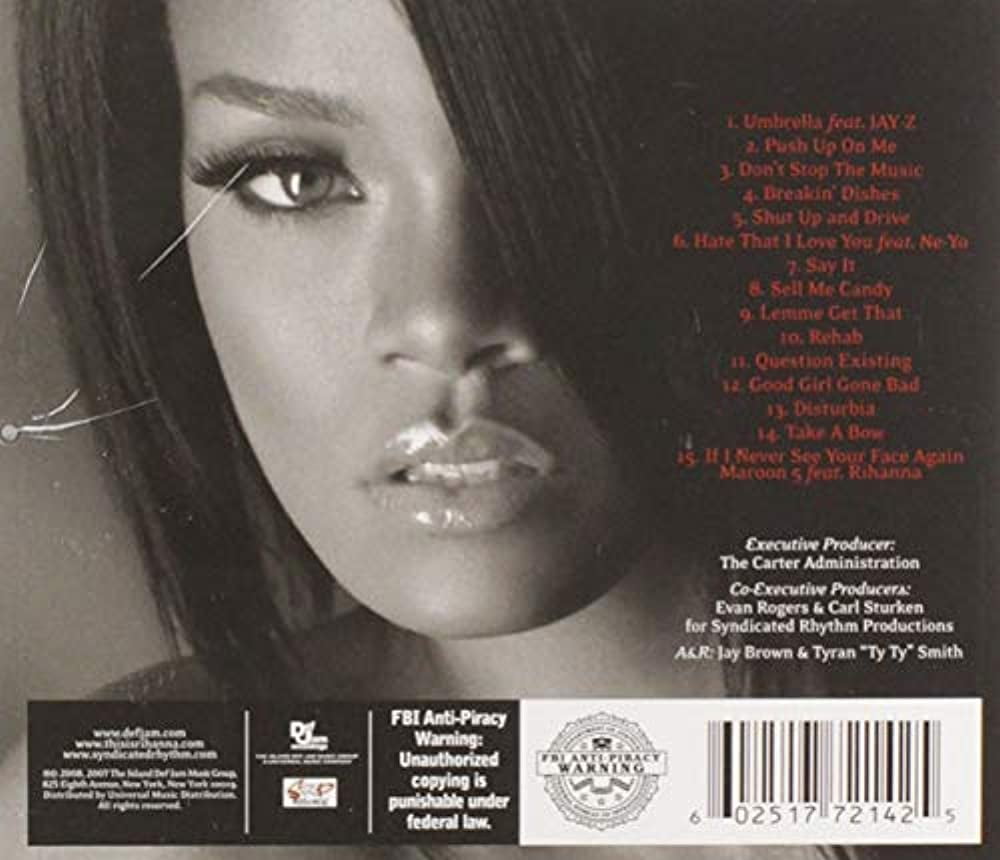

While this is a fine, if uneven album, the only way to enjoy a significant portion of it is by taking it as pure entertainment. Even with a captivating, drum-less reggae groove, it's hard to hear lines like "Your love hit me to the core" and "It's so foolish how you keep me wanting more" and think that she's fine and could be singing about anyone. The same could be said of "No Love Allowed," which comes along a little later. Perhaps no one should read anything into it. 2/Abyss." Over a swelling and receding production with echoes of Kim Carnes' "Bette Davis' Eyes," Rihanna mourns ("Felt like love struck me in the night/I pray that love don't strike twice"), then confesses ("Mother Mary, I swear I wanna change"), then surrenders ("I'm prepared to die in the moment"). Rihanna's partner proposes to make out in a Lexus prior to proclaiming that the relationship "ain't nobody's business." The celebration is followed by "Love Without Tragedy/Mother Mary," conjoined songs with a wide theatrical scope akin to that of the-Dream's own "Nikki, Pt. "Nobody's Business," flecked with elements from Michael Jackson's "The Way You Make Me Feel," is a beaming if somewhat belligerent disco-house duet with Chris Brown. Both of them were written and produced by Terius "The-Dream" Nash and Carlos "Los" McKinney. Two of the album's most intriguing, contrasting, and not-so-everywoman tracks appear consecutively during the latter half. Moments such as that one are so convincing that the few everywoman heart-on-sleeve songs - with the exception of the massive, slamming, wailing power ballad that is "What Now" - don't sound all that natural. Wrapped in a serene sneer, Rihanna's trash talk is something else. This goes for "Pour It Up," a characteristically chilly and booming Mike Will collaboration that might as well be a sequel to "Bandz a Make Her Dance," the producer's hit with Juicy J. After unleashing her double-platinum eighth album in 2016 - which boasted hits including the juggernaut Drake-assisted Work, Needed Me and Love On The Brain - Rihanna has dominated the charts. Continuing the trend that began on Rated R, Rihanna's at her best when she's flaunting. Not only is Unapologetic just as varied as Rihanna's past albums - it's another timely refresh of contemporary pop music - but it's a little more exploratory and a whole lot deeper, too. Even with that change of pace, the possibility of it signaling an overall change in direction was slight. She didn't go with a dramatic ballad like "Russian Roulette" or a big dance number like "Only Girl (In the World)" and "We Found Love." Instead, the nod went to a midtempo pop ballad, "Diamonds" - as in "We're like diamonds in the sky" (rather than stars in a mine), a simple and effective, light in meaning yet massive in sonics, quasi-processional.


The singer took a different route with the lead single. 'SOS' (2006) Rihanna dug deeper into music for the dance floor with 'SOS.' It incorporates a sample from Soft Cells new wave classic 'Tainted Love. The reason being that many follow-up vinyl releases were inferior to the first vinyl release (or at least lacked some of the extras found in the first release - such as postcards, posters, lyric sheets etc).In 2012, right on schedule, Rihanna delivered her fourth annual November album. 'Pon De Replay' (2005) For Rihanna, it all began with the island dance sounds of 'Pon de Replay.' It was one of three songs included on her initial demo sent to record labels. In many cases the packaging is superior to, or at least more elaborate than the majority of vinyl releases. They are also known as LP replicas as they tend to exactly replicate the original packaging of the first vinyl release. What is a Mini-LP CD?Ī Mini-LP is a CD version of something that was originally released as a 12" (12 inch) vinyl LP. However, as the format became more popular and began to be used by more manufacturers, the generic "digipack" came to be used to describe all soft CD packaging. Digipacks were first created by MeadWestvaco, and their product, called Digi-Pak, is trademarked. Usually, the portion of the digipack that hold the CD is made of plastic like a traditional jewel case CD - the plastic part is simply attached to the paper background. Digipacks can flip open like a book, or it can have three parts, so that one portion of the packaging opens to the right and one to the left, with the CD in the center portion. Digipacks are a type of CD packaging made out of card stock or other heavy paper/cardboard material.


 0 kommentar(er)
0 kommentar(er)
